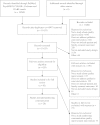A systematic review of communication quality improvement interventions for patients with advanced and serious illness
- PMID: 23099799
- PMCID: PMC3599019
- DOI: 10.1007/s11606-012-2204-4
A systematic review of communication quality improvement interventions for patients with advanced and serious illness
Abstract
Background: Effective communication is an interaction between two or more people that produces a desired effect and is a key element of quality of care for patients with advanced and serious illness and their family members. Suboptimal provider-patient/family communication is common, with negative effects on patient/family-centered outcomes.
Objectives: To systematically review the evidence for effectiveness of communication-related quality improvement interventions for patients with advanced and serious illness and to explore the effectiveness of consultative and integrative interventions.
Data sources: MEDLINE, CINAHL, PsycINFO, Cochrane, and DARE from 2000 through December 2011 and reference list of eligible articles and reviews.
Study eligibility criteria, participants and interventions: Prospective, controlled quality improvement studies in populations with life-limiting or severe life-threatening illness with a primary intervention focus of improving communication with patients and/or families.
Study appraisal and synthesis methods: Two investigators independently screened and abstracted data on patient/family-centered outcomes.
Results: We included 20 studies; 13 (65 %) were in intensive care. We found four intervention types: (1) family meetings with the usual team (11 studies, 77 % found improvement in healthcare utilization), (2) palliative care teams (5 studies, 50 % found improvement in healthcare utilization), (3) ethics consultation (2 studies, 100 % found improvement in healthcare utilization), and (4) physician-patient communication (2 studies, no significant improvement in healthcare utilization). Among studies addressing the outcomes of patient/family satisfaction, 22 % found improvement; among studies addressing healthcare utilization (e.g., length of stay), 73 % found improvement. Results suggest that consultative interventions, as opposed to integrative ones, may be more effective, but more research is needed.
Limitations: Study heterogeneity did not allow quantitative synthesis.
Conclusions and implications of key findings: Communication in the care of patients with advanced and serious illness can be improved using quality improvement interventions, particularly for healthcare utilization as an outcome. Interventions may be more effective using a consultative approach.
References
-
- Curtis JR, Patrick DL, Shannon SE, Treece PD, Engelberg RA, Rubenfeld GD. The family conference as a focus to improve communication about end-of-life care in the intensive care unit: opportunities for improvement. Crit Care Med. 2001;29(2 Suppl):N26–N33. doi: 10.1097/00003246-200102001-00006. - DOI - PubMed
-
- Lorenz KA, Lynn J, Dy SM, et al. Evidence for improving palliative care at the end of life: a systematic review. Ann Intern Med. 2008;148(2):147–159. - PubMed
Publication types
MeSH terms
LinkOut - more resources
Full Text Sources
Medical
Research Materials


